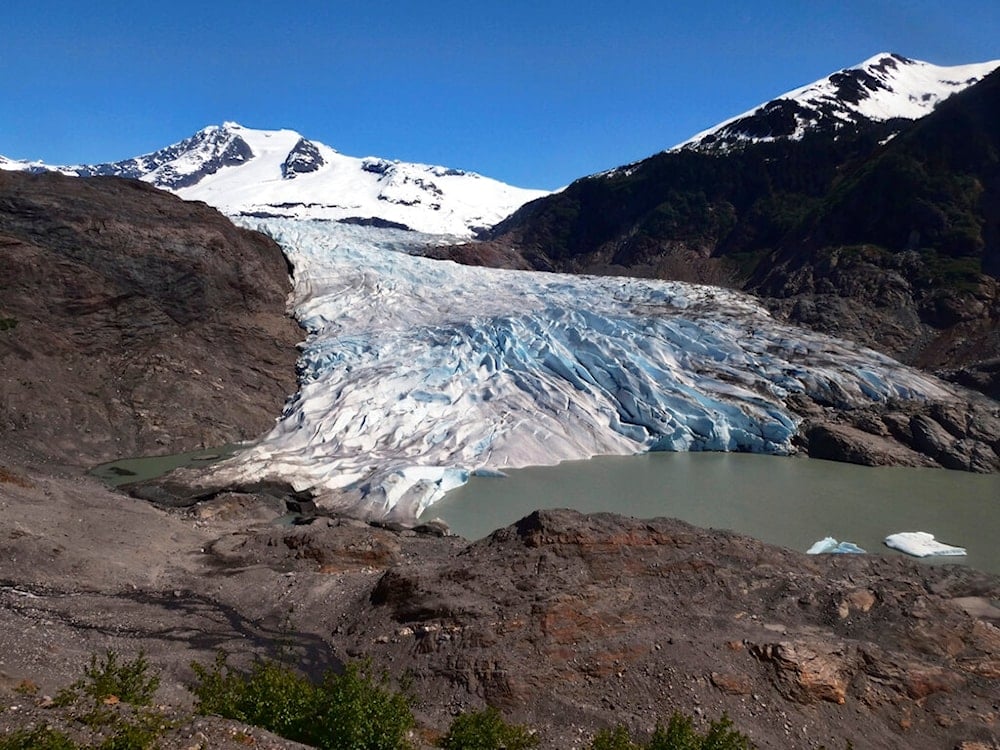Russia won't reclaim Alaska territory: US State Dept.
Tensions have been recently mounting between the US and Russia in the Arctic as a result of US sanctions negatively affecting Russia's gas plans in the region.
-

Chunks of ice float on Mendenhall Lake in front of the Mendenhall Glacier on Monday, May 30, 2022, in Juneau, Alaska. (AP)
Principal Deputy Spokesperson for the US State Department Vedant Patel stated on Monday that the Russian Federation will not reclaim the territory in Alaska that was sold to the United States.
This comes after Russian President Vladimir Putin approved a decree allocating funds for the identification and protection of properties in former Russian and Soviet territories a week ago. Nevertheless, the specific implementation details of the decree remain unclear.
"Certainly he [Putin] is not getting it back," Patel said during a press briefing while responding to a question about the decree and its potential impact.
In 1867, the Russian Empire sold Alaska to the United States for $7.2 million, marking the end of its colonization efforts in the region, which had been established since the 1700s.
Read more: Russia, China readying agreement on cooperation project in Arctic
Recently, tensions have been mounting between the US and Russia as a result of US sanctions negatively affecting Russia's gas plans in the region.
Due to sanctions, the US has implemented restrictive measures against various entities, including Russian natural gas producer Novatek, two transshipment barges handling liquefied natural gas (LNG) situated near Murmansk and Kamchatka, and the Arctic LNG 2 project.
These sanctions extend to several partners associated with these entities, both within Russia and internationally, including partnerships located in countries like the UAE.
During a congressional testimony in November 2023, Assistant Secretary for Energy Resources Geoffrey Pyatt outlined the United States' approach to "systematically reduce Russia's future energy revenue."
"Just last week, for instance, we leveled new sanctions against a project in the Arctic, Arctic LNG 2, which is Novatek's flagship LNG project, which Novatek set in motion with the aspiration of developing Russia as the largest LNG exporter in the world," explained Pyatt in front of the US Senate Foreign Relations Committee.
"Our objective is to kill that project. And we are doing that through our sanctions working with our partners in the G7 and beyond," he added.
Last Tuesday, TotalEnergies announced that it has commenced a force majeure process for the Arctic LNG 2 project in Russia, citing US sanctions.
In a statement, the company stated, "We have initiated the force majeure process in accordance with existing contracts, and we will comply with applicable sanctions regimes in accordance with our principles of conduct."
"Consequently, no offtake of LNG from Arctic LNG 2 by TotalEnergies is planned in 2024," the statement added.
This declaration implies that, due to the force majeure process and the impact of US sanctions, TotalEnergies does not intend to engage in the offloading or procurement of liquefied natural gas (LNG) from the Arctic LNG 2 project throughout the specified year of 2024.
In December, the Russian newspaper Kommersant reported that several foreign stakeholders in the Arctic LNG 2 project had halted their involvement in response to the imposed sanctions.
Read more: Russia steps up efforts to develop, secure Arctic zone

 3 Min Read
3 Min Read










